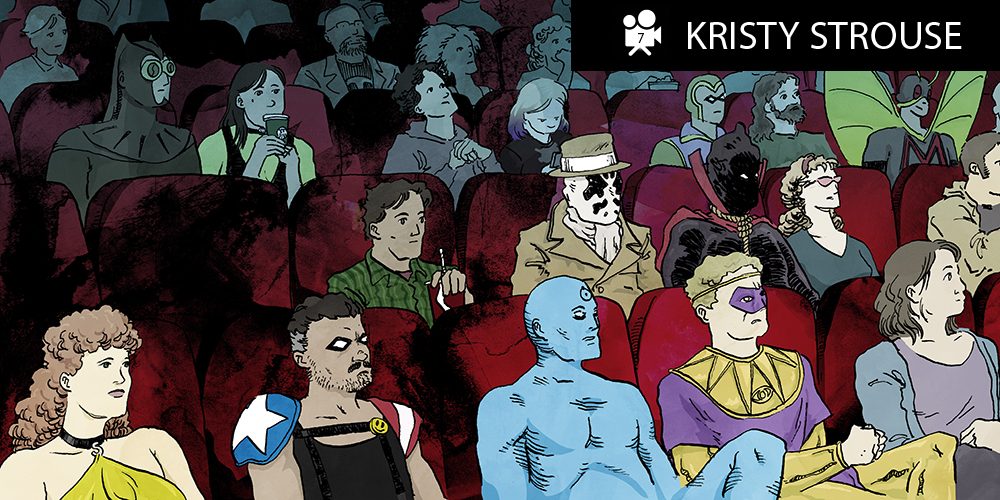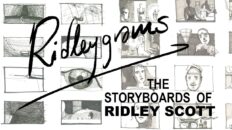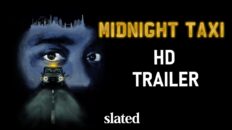Illustration by Seth T. Hahne
K risty Strouse is the Operations Manager at Film Inquiry where she contributes film and television reviews, conducts interviews, edits writer’s pieces, and helps coordinate interactions with film promoters and advertisers. She was kind enough to sit down and answer some questions for us in our ongoing series talking to film writers and critics.RUD: Hello Kristy. Thank you for letting us ask you a few questions. Can you tell us a little about what got you started writing film criticism? What made you interested in writing on film and television in the first place?
KRISTY STROUSE: I have always loved film and television. It’s always been a passion, and it has been one of the only constants in my life since childhood. My parents claim to not be big fans of either, but they took some role in shaping me, even if it was subconsciously. From a very young age I was being introduced to films, and it left its mark. I’ve also always loved writing. It seemed inevitable to me to eventually do this in a context that wasn’t scribbling in my notebook or discussing films with my boyfriend.
RUD: You are currently a contributor and Editor at Film Inquiry. Can you tell us a little about Film Inquiry and your work there?
STROUSE: Yeah, I’m the Operations Manager, so I help handle communications with the writers, as well as outside parties. I do my best to assist with the inner-workings of the website and keeps things flowing smoothly. I also write fairly often, which I love. In all capacities I adore being at Film Inquiry. Not only because I’ve had the ability to work with amazing people, including our Editor-in-Chief, Manon De Reeper, but also because of what it’s brought me. It has been incredibly important and enriching to me. Probably more than I could ever convey.
RUD: Besides writing criticism, you’ve conducted a lot of interviews yourself. One of my favorite interviews you did in the last year was with Kelly Macdonald, for Puzzle. What is the most challenging part of interviewing a subject? And do you ever get starstruck?
STROUSE: Thanks! I think it’s always challenging to plan precisely, because there are always variables. You don’t know how long the individual will take answering each question (usually you have a time limit) so it can be tough to have enough questions. I’m also a very anxious person, so speaking to people I admire can be hard, but ultimately rewarding.
I definitely get star struck. I feel like it would be weird if I didn’t, to an extent, because many are people I have watched for years. All from the comfort of my home in small town USA. I’m always very excited because of this, and I think that’s an important element. The excitement motivates me.
RUD: As a follow up, what is the favorite interview you’ve done so far?
STROUSE: That’s tough to say, as I’ve loved them all. I would have to go with some of the interviews that I’ve had with those that I had been especially admirable of prior, such as Debra Granik, Rebecca Hall, or Mark Duplass. However, I love interviewing individuals who are first time writers or directors because there’s a different kind of energy that’s wonderful.
RUD: Are there any films or television shows you have found particularly challenging or difficult to write about? If so, why?
STROUSE: I don’t have one in particular that I can recall, but I’m sure there have been plenty.
If you don’t like the film or show, but didn’t necessarily loathe it, it can be tough. Especially if you feel it’s uneventful or mundane. Those strange middle areas can be murky waters to navigate. If you loved something you’ve seen it’s so much easier to write about. Obviously, you wish this is always the case, but then… what’s the point?
RUD: Do you think there are particular challenges to being a female critic?
STROUSE: Absolutely. I think some people, unfortunately, take women less seriously.
It’s also incredible to be one, because it’s another way to have a voice, and provide your opinion even if it is challenged. So, even with the difficulties, I wouldn’t trade it for anything. I’m proud to be a female critic. Especially as more and more female driven films are being made. Maybe in some minute way I can contribute to more coverage for them. That’s amazing… a dream. A friend once told me that some women writers she knows change their name to a pen name or something that’s less obviously female to avoid someone overlooking them because of their sex. It’s harsh, but true, and it can be hard to even be acknowledged as a serious critic. Hopefully someday this can change.
RUD: As a writer, readers get to hear your thoughts on specific films. But how are your thoughts shaped? What are some of your influences in how you think about film?
STROUSE: I think about the technical aspect, what’s working and what isn’t, but I also refer to my gut and how the movie makes me feel. Films are a very personal experience, and the differences in how we perceive make them special. One person can have a completely different take than another from the same film. Sometimes I have to separate myself from what I’ve seen for a little while to see how much of an impression it’s left. Last year when I watched Moonlight I found that with each day that passed after I saw it I loved it even more. A beautiful film like that can really resonate.
I also grew up to Siskel and Ebert, as well as Roeper. I think their way of analyzing movies helped to shape my process as well.
RUD: How does art, and film in particular, relate to your view of existence? Do you think films are a positive influence on the world?
STROUSE: I think they are. Some might consider movies to be insignificant to the scope of life and trivial in a sense. However, all art stems from the truest of human emotions: fear, love, loss, laughter. It’s a way of storytelling and broadening minds. It’s a way of finding that you’re not alone in your feelings and doubts.
Someone might watch a movie and find that they relate to the characters and the story. This can be uplifting. Film is just another way of storytelling and that always has a positive effect. They are a very real art form that can capture the time and culture they’re portraying, seemingly freezing it in time. It’s an important element of our world, and it has the potential to connect everybody.
RUD: Is there one film, not necessarily your favorite, that you are always excited to show someone the first time?
STROUSE: Oh absolutely, but there isn’t one. It’s funny because earlier I mentioned that my parents don’t refer to themselves as movie fans. They often ask me for movies to watch or if ones are any good, and whenever they do watch something I’ve recommended I can’t wait to talk to them and see what they think. I’ll often be like, “Isn’t it awesome when this happens?” Or “Wasn’t this scene heartbreaking?” Their reactions, especially when they loved it, make me incredibly happy. When you share a film with someone and it has a profound response, that’s an amazing feeling. And I am always ecstatic to talk about new films.
More specifically I’d say I am always excited to share my favorites: films by Martin Scorsese and films with Leonardo DiCaprio. Also, things like the Lord of the Rings… monumental cinematic feats. I’ve had the luxury of discussing some amazing indies with my position at Film Inquiry and always love to boast about those. An example of a recent one is All About Nina. I can really gush about that film.
And I love recommending TV series to people. Especially ones as spectacular as say… Game of Thrones.
RUD: Are there any current film critics you like to read? And what do you think makes them worth reading?
STROUSE: There are many that I follow, and I don’t want to single anyone out in the event it makes others feel inferior because there are SO many.
I love all of the writers for Film Inquiry, and as new writers join our group I love discovering them. We have a very diverse set of writers from all over the world, and each of their pieces is thoughtful and intelligent.








